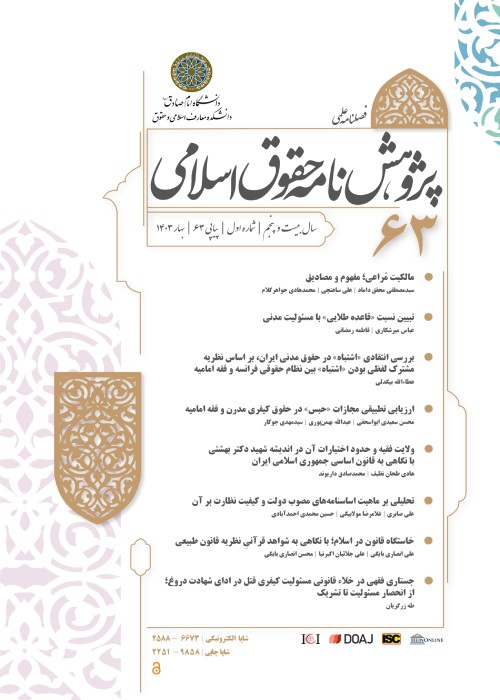A Reflection on the Practice of the Guardian Council in Examining the Jurisprudential Requirements Relevant to International Treaties
The Iranian legal landscape is deeply rooted in Islamic principles, with the Constitution of the Islamic Republic of Iran enshrining many principles that affirm the integration of the legal system with Islamic norms. This integration is explicitly emphasized in the constitutional provisions, notably article 1, clause 12 of article 2, and particularly article 4. However, the practical implementation of Islamic laws in the Islamic Republic of Iran is entrusted to various legal and executive systems, with the Guardian Council holding a significant role. This council, in accordance with articles 4 and 96 of the Constitution, assumes the responsibility of ensuring that the legal and executive systems align with Islamic principles.
In every legal system, there exists a hierarchy of norms, necessitating the alignment of domestic regulations and laws with fundamental principles at the top of the legal hierarchy. In the context of the Islamic Republic of Iran, this alignment is particularly crucial when considering the approval of international treaties. The approval of such treaties in the country sets the stage for a confrontation between domestic and international legal systems. Any discordant interpretation of the foundations of these legal systems leads to distinct legal consequences for the nation. Therefore, understanding the relationship between domestic and international law in the Iranian legal system requires an examination of the Islamic perspective on the interaction between these two legal systems.
Research Question:
This study seeks to address the following central question: How does the Iranian legal system, guided by the Islamic perspective, manage the relationship between domestic and international law in the context of the approval of international treaties?
Research Hypothesis:
The hypothesis guiding this research is that the Islamic legal principles, as interpreted by the Guardian Council, emphasize the unity of domestic and international legal systems. Unlike contemporary legal systems, where distinctions between domestic and international laws are shaped by practical considerations, Islamic jurisprudence tends towards a unified legal system. This hypothesis is rooted in the understanding that the Islamic conception of state and governance differs significantly from modern concepts, resulting in a more unified legal framework.
Methodology & Framework, if Applicable:
This research employs a descriptive-analytical approach, utilizing library-based data collection methods. The focus of the study is on examining the legal framework governing international treaties in the Islamic Republic of Iran, with specific attention to the perspectives articulated by the Guardian Council. By delving into the Council's interpretations of international treaties, this research aims to shed light on the compatibility of these treaties with Islamic legal standards. The chosen methodology allows for an in-depth exploration of the legal and religious foundations that influence Iran's approach to international agreements, emphasizing the importance of ensuring conformity with Sharia principles.
In summary, this paper aims to elucidate the Guardian Council's role in evaluating the legal implications of international treaties in Iran, offering insights into how Islamic principles shape the nation's approach to both domestic and international legal frameworks.
International treaties and agreements, while fundamentally serving international interests, require integration and coherence with domestic laws according to each nation's legal system. In the Iranian context, international agreements remain independent until approved by the competent authorities in accordance with domestic laws. However, the shadow of their obligatory effects persists due to elements of international customary law, placing the nation's international commitments under its influence.
Aligned with the principles of the Islamic Republic of Iran, where the sacred Sharia and the Constitution occupy the top tier of the legal hierarchy, ordinary laws and other domestic regulations occupy lower levels. Given the adherence to both domestic and international legal systems in the country's laws, international agreements cannot be exempt from this hierarchical structure. According to the Guardian Council's theories and its practices in reviewing international agreements, it emphasizes the necessity for international agreements to align with Sharia principles, akin to their conformity with ordinary parliamentary resolutions.
Understanding these principles becomes doubly crucial when the subjects of international treaties concern private individuals subject to national laws. This is prominently observed in numerous judicial cooperation agreements, often incorporating criticisms and Sharia-based regulations from the Guardian Council in the examination of international documents.
In conclusion, international treaties and agreements in the Islamic Republic of Iran are subject to a meticulous evaluation process, guided by the principles articulated by the Guardian Council. The integration of these agreements with the domestic legal hierarchy underscores the unified approach that the Iranian legal system endeavors to maintain. The Guardian Council, guided by principles such as The “Negation of Domination” Rule [Nafy-e-Sabil], prohibition of referring to unjust rulers, rejection and acceptance of non-Islamic foreign laws, prohibition of usury, and the Sharia compatibility of pre-revolution treaties, has established a consistent pattern in its decisions.
The study highlights the enduring significance of the Guardian Council's role in shaping Iran's international engagement, emphasizing the ongoing impact of its interpretations on various facets of international relations. As the Islamic Republic of Iran continues to navigate the global stage, the non-changing methodology of the Guardian Council in the realm of international documents signifies a steadfast commitment to its established approach. The study encourages ongoing scrutiny of the Guardian Council's influence in international agreements, anticipating that its decisions will continue to shape the nation's standing in the international arena for the foreseeable future.
- حق عضویت دریافتی صرف حمایت از نشریات عضو و نگهداری، تکمیل و توسعه مگیران میشود.
- پرداخت حق اشتراک و دانلود مقالات اجازه بازنشر آن در سایر رسانههای چاپی و دیجیتال را به کاربر نمیدهد.


